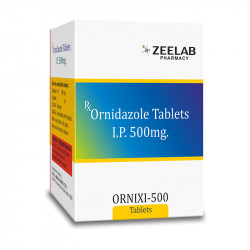Ornidazole
Ornidazole is an antibiotic and antiprotozoal medication used to treat various bacterial and parasitic infections. It is effective against infections caused by anaerobic bacteria and protozoa, including amoebiasis, giardiasis, trichomoniasis, and bacterial vaginosis. Ornidazole works by inhibiting the DNA synthesis of the microorganisms, leading to their destruction. It is commonly prescribed for gastrointestinal infections, gynecological infections, and certain post-surgical infections.
Uses of Ornidazole
- Treatment of amoebiasis (intestinal and liver infections)
- Management of giardiasis (intestinal parasite infection)
- Used for trichomoniasis (sexually transmitted infection)
- Treatment of bacterial vaginosis
- Prevention and treatment of post-surgical infections
- Management of certain dental infections
How Ornidazole Works
Ornidazole belongs to the nitroimidazole class of antibiotics. It works by damaging the DNA of bacteria and protozoa, inhibiting their growth and eventually eliminating the infection. It is specifically effective against anaerobic microorganisms, which thrive in low-oxygen environments.
Benefits of Ornidazole
- Effectively treats bacterial and protozoal infections
- Helps relieve symptoms of gastrointestinal and vaginal infections
- Prevents infections after surgery
- Has a long-lasting effect, requiring fewer doses
- Well-tolerated with minimal side effects
How to Take Ornidazole
Ornidazole should be taken as prescribed by a doctor. It is usually taken orally with or without food. The dosage depends on the severity of the infection and the patient’s condition. Complete the full course of treatment, even if symptoms improve, to prevent antibiotic resistance.
Types of Dosage Available
- Ornidazole tablets
- Ornidazole suspension (for children)
- Ornidazole injection (for severe infections)
Side Effects of Ornidazole
- Nausea and vomiting
- Headache and dizziness
- Metallic taste in the mouth
- Abdominal discomfort
- Fatigue and weakness
- Allergic reactions like rash or itching (rare)
Safety Advice
- Avoid alcohol consumption during and after treatment to prevent adverse reactions
- Do not take if allergic to Ornidazole or similar antibiotics
- Use with caution in patients with liver or kidney disorders
- Consult a doctor before use during pregnancy and breastfeeding
- May cause dizziness; avoid driving or operating heavy machinery
- Complete the full course to prevent resistance and recurrence of infection
Frequently Asked Questions (FAQs)
Q. What is Ornidazole used for?
A. Ornidazole is used to treat bacterial and parasitic infections, including amoebiasis, giardiasis, trichomoniasis, and bacterial vaginosis.
Q. Can I drink alcohol while taking Ornidazole?
A. No, alcohol should be avoided during and up to 72 hours after treatment, as it can cause nausea, vomiting, and dizziness.
Q. How long does it take for Ornidazole to work?
A. It usually starts working within a few hours, but completing the full course is essential to fully eliminate the infection.
Q. Can Ornidazole be taken on an empty stomach?
A. Yes, it can be taken with or without food, but taking it with food may help reduce stomach discomfort.
Q. Is Ornidazole safe for pregnant women?
A. It should only be used during pregnancy if prescribed by a doctor, as its safety in pregnancy is not fully established.
Download India's most affordable pharmacy app
- Compare with medicine prices
- Save upto 90% on your medicine bills

Temperature Controlled storage and delivery

Regular Sanitization

Disinfected Packaging















 Added!
Added!